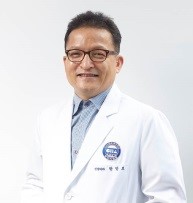 Dr. Inbo Han, MD, PhD
Dr. Inbo Han, MD, PhD
Department of Neurosurgery, Spine Center
CHA University, School of Medicine, South Korea
“Matrilin-3 pretreatment improves the function of mesenchymal stem cells in the intervertebral disc repair”
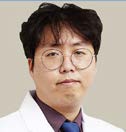 Dr. UnYong Choi, MD
Dr. UnYong Choi, MD
Department of Neurosurgery, Spine Center
CHA University, School of Medicine, South Korea
“Disc regenerative therapy of intervertebral disc degeneration in stem cell with scaffold”
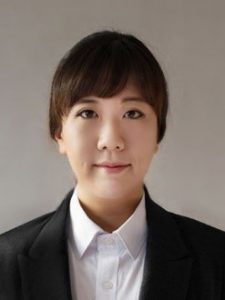 Ji-hye Lee, PhD
Ji-hye Lee, PhD
Medical & scientific affairs, CGBio, Co., Ltd., South Korea
“Introduction of CGBio”
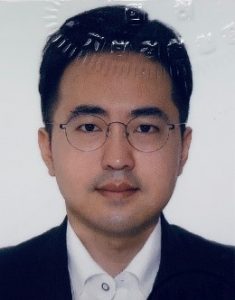 Chanwoo Ryan Hong
Chanwoo Ryan Hong
Director, illuminaid inc., South Korea
R&D team3 manager, CGBio, Co., Ltd., South Korea
“Introduction of custom 3d printing system for bioprint”
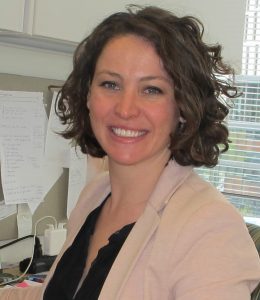 Kara L. Spiller, PhD
Kara L. Spiller, PhD
Biomaterials and Regenerative Medicine Laboratory
School of Biomedical Engineering, Science, and Health Systems
Drexel University, Philadelphia
Diabetes and peripheral arterial disease affect hundreds of millions of people worldwide. Patients with these conditions frequently develop chronic wounds on the lower limbs that lead to amputation, with a 5-year mortality rate as high as 77%. Macrophages, the primary cell of the innate immune system, are critical regulators of angiogenesis and wound healing. Their dysfunction is strongly implicated in arterial dysfunction, limb ischemia, and poorly healing chronic wounds. The goal of the Biomaterials and Regenerative Medicine Laboratory at Drexel University is to understand the mechanisms by which macrophages orchestrate successful angiogenesis and tissue regeneration and to develop novel biomaterial strategies that apply these principles to pathological situations, in order to ultimately prevent limb amputation. This talk will focus on the effects of temporal changes in macrophage phenotype on angiogenesis, the design of biomaterials and drug delivery systems to modulate macrophage phenotype for enhanced angiogenesis, and the development of macrophage phenotype-related biomarkers to assist in clinical decision making for a personalized medicine approach to wound care.
Dr. Kara Spiller is an Associate Professor in Drexel University’s School of Biomedical Engineering, Science, and Health Systems. Her research interests include the role of immune cells in tissue regeneration, the design of immunomodulatory biomaterials, and international engineering education. Her research is funded by the NIH, the NSF, and private foundations. Her awards include a Fulbright fellowship, the NSF CAREER award, and the United States nomination for the ASPIRE prize.
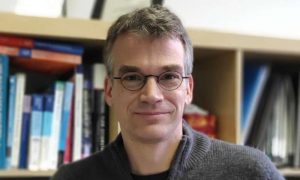 Professor. Matthias Heinemann
Professor. Matthias Heinemann
University of Groningen,
Netherlands
The principles governing cellular metabolic operation are poorly understood. Because diverse organisms show similar metabolic flux patterns, we hypothesized that a fundamental thermodynamic constraint might shape cellular metabolism. Here, we develop a constraint-based model for Saccharomyces cerevisiae with a comprehensive description of biochemical thermodynamics including a Gibbs energy balance. Non-linear regression analyses of quantitative metabolome and physiology data reveal the existence of an upper rate limit for cellular Gibbs energy dissipation. By applying this limit in flux balance analyses with growth maximization as the objective function, our model correctly predicts the physiology and intracellular metabolic fluxes for different glucose uptake rates as well as the maximal growth rate. We find that cells arrange their intracellular metabolic fluxes in such a way that, with increasing glucose uptake rates, they can accomplish optimal growth rates but stay below the critical rate limit on Gibbs energy dissipation. Once all possibilities for intracellular flux redistribution are exhausted, cells reach their maximal growth rate. This principle also holds for Escherichia coli and different carbon sources. Our work proposes that metabolic reaction stoichiometry, a limit on the cellular Gibbs energy dissipation rate, and the objective of growth maximization shape metabolism across organisms and conditions.
Download the event poster HERE
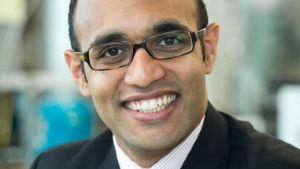 Associate Professor Vikramaditya Yadav
Associate Professor Vikramaditya Yadav
The Biofoundry, Department of Chemical and Biological Engineering
University of British Columbia
Hosted by Prof. Krishna Mahadevan
The principal theme of Prof. Yadav’s research is the utilization of metabolic & enzyme engineering to investigate and customize novel biosynthetic enzymes that can convert biomass-derived feedstocks into value-added chemicals. His group also extends the principles of metabolic engineering to the design and development of unique bioremediation strategies to rehabilitate the water quality in and around industrial zones and develop new mining biotechnologies. In addition to green engineering, his research group also pursues medical biotechnology research, and focuses on bioengineering for assay development, lead generation and product development.
The seminar will provide a broad overview of the research and commercialization efforts that are afoot in his laboratory at UBC. In particular, the talk will cover some of his group’s recent successes in elucidating and using a novel plant metabolic pathway for the synthesis of value-added chemicals, the development of a biosensor for screening insect repellants, bioremediation of oil sands tailings ponds and the fabrication of biohybrid materials for harvesting solar energy.
_____________________________________
Vikramaditya G. Yadav is an Associate Professor in the Department of Chemical & Biological Engineering and the School of Biomedical Engineering at the University of British Columbia (UBC). He is a leading voice on synthetic biology research, education and translation in Canada, and his research program is distinguished by its impact and strong emphasis on technology translation, and his group collaborates with several companies. He is also the Chief Technology Officer of Metabolik Technologies Inc., an environmental biotechnology company, and serves on the boards of InMed Pharmaceuticals and Phytonix Corporation. He is a highly respected educator and currently serves as the Director of the Master of Engineering Leadership program in Sustainable Process Engineering at UBC. He currently serves as an Associate Scientific Advisor for Science Translational Medicine and an Associate Editor of Catalysis in Green Chemistry & Engineering. He was recognized by the CSChE with its Emerging Leader in Chemical Engineering Award in 2017
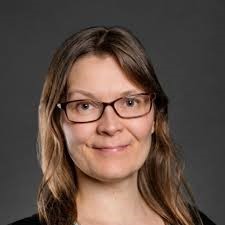 Mining biotechnology provides sustainable alternatives to traditional mining methods for extracting value from low grade ores and wastes. Moreover, biotechnology can be harnessed to treat (bio)hydrometallurgical and mine waters and decrease the environmental footprint of mining operations. This presentation will give an overview of CSIRO activities in bioleaching and bio-oxidation of low-grade ores, mine wastes and post-consumer wastes such as batteries and electronic wastes. Moreover, studies on removing inorganic and organic contaminants and recovering value from metallurgical effluents will be discussed.
Mining biotechnology provides sustainable alternatives to traditional mining methods for extracting value from low grade ores and wastes. Moreover, biotechnology can be harnessed to treat (bio)hydrometallurgical and mine waters and decrease the environmental footprint of mining operations. This presentation will give an overview of CSIRO activities in bioleaching and bio-oxidation of low-grade ores, mine wastes and post-consumer wastes such as batteries and electronic wastes. Moreover, studies on removing inorganic and organic contaminants and recovering value from metallurgical effluents will be discussed.
____________________________________________
Anna Kaksonen has about 20 years’ experience in various aspects of biomining, from bio-oxidising and bioleaching low-grade ores to treating waste streams and recovering resources. During her Doctor of Technology degree, she developed fluidized bed reactor processes for biotechnical mine water treatment at Tampere University of Technology (TUT) in Finland. As a Senior Researcher at TUT, she also contributed to the development of heap bioleaching for complex low-grade black schist ores, bioprocesses for excess iron and sulfate removal from barren leach liquors and metal recovery from various metallurgical wastes. In 2009 Anna joined Commonwealth Scientific and Industrial Research Organisation (CSIRO), Australia as a Team Leader of Environmental and Industrial Biotechnology. In 2017 she was appointed as Group Leader for Biotechnology and Synthetic Biology. Anna has delivered projects to a number of companies on base metal and precious metal biomining, as well as biotechnical removal of organic and inorganic impurities from hydrometallurgical process waters. She has also been active in urban mining, developing bioprocesses for the extraction of metals from electronic wastes.
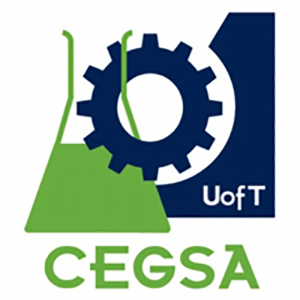 Join CEGSA for their annual Wine and Cheese event. This is a great time for staff, students, and faculty to meet each other at the start of the new academic year while dining on some delicious cheeses, wine, and beer.
Join CEGSA for their annual Wine and Cheese event. This is a great time for staff, students, and faculty to meet each other at the start of the new academic year while dining on some delicious cheeses, wine, and beer.

Co-hosted with the Institute for Studies in Transdisciplinary Engineering Education and Practice (ISTEP)
Host: Greg Evans
There has been a race to build active learning spaces, and particularly spaces that are heavily technology enabled. At the University of Toronto there are several major projects of this nature underway or recently completed, including the new Myhal building and the Transforming the Instructional Landscape (TIL) project. There is a general sense that classroom environments of this nature support active learning pedagogies, but to what degree is this supported by the literature and what aspects of the design are important? In this talk Prof. McCahan will explore the literature that exists on active learning spaces and the design concepts that underpin this trend in classroom construction. She will also discuss her current research in this area and the gaps in our understanding that need to be investigated to ensure that classrooms enable, rather than hinder, faculty who are implementing high impact teaching practices.
___________________________________________________________________________________________________
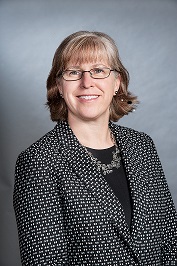
Susan McCahan is currently the Vice Provost, Innovations in Undergraduate Education and Vice Provost, Academic Programs at the University of Toronto. She is formerly the Vice Dean, Undergraduate in the Faculty of Applied Science and Engineering. Her research area is in engineering education and, in particular, in considering engineering education as a designed environment. Most recently her work has focused on Universal Instructional Design and assessment. She is the past President of the Canadian Engineering Education Association, a Fellow of the American Association for the Advancement of Science and has been the recipient of several major teaching awards including the 3M National Teaching Fellowship and the Medal of Distinction in Engineering Education from Engineers Canada.
Click here for more information on Lectures of the Leading Edge 2019-2020
Professors Yi Wang, Yanqiu Huang, Zhixiang Cao
Xi’an University of Architecture and Technology, Xi’an, China
The seminar will focus on leading edge research in China on ventilation and energy conservation for industrial processing plants. Team members and research platforms of national key laboratories will be discussed. An outline will be presented of the major research work at Xi’an University in the industrial ventilation field and how the research has been applied to engineering applications for specific industrial applications. An extensive compilation of Chinese standards as they apply to industrial ventilation and energy efficiencies will be discussed. A scientific review will include research projects currently underway at Xi’an University which includes the scope of independent research projects, domestic collaboration, and also a new thrust in international collaboration with the global scientific research community. Two examples of innovative research in the industrial ventilation field will be presented. The first example will be the use of scale model experiments to optimize the design of local ventilation systems. Air pollution and energy consumption in industrial plants are serious challenges to sustainable development in China’s economy. The second example will be the introduction of innovative research in the area of vortex ventilation techniques to the application of various ventilation systems and practical engineering applications.
Research Interests of Professor Wang and her research team:
- Transport of contamination and the efficiency of ventilation systems in industrial buildings;
- Building environment and energy efficiency;
- Theories and methods of natural ventilation;
- Assessment of thermal comfort and indoor air quality
Click the link to download the seminar poster download the seminar poster.
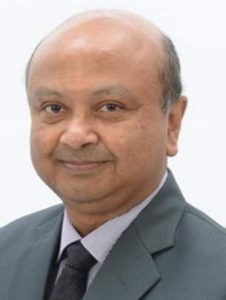 Sourav K. Sengupta, PhD
Sourav K. Sengupta, PhD
Sr. Technical Fellow,
Dupont Safety & Construction
Wilmington, DE
In the past three decades, there has been a concerted effort in the chemical, specialty chemical, agrochemical, pharmaceutical, and petroleum industry to design cost-advantaged, inherently safer, sustainable, and environmentally-friendly processes. Catalysis plays a crucial role in improving process efficiencies and process intensification leading to increased atom utilization, reduced by-product formation, cheaper process, and lower capital investment. Also, there is an increasing interest in using renewably-sourced feedstocks for the production of fuels, chemicals, and advanced materials due to rising petroleum prices, limited availability of petroleum resources, and increasing consumer consciousness about sustainable processes.
Although catalysis is a major tour-de-force in driving this efficacious and green chemistry revolution, the role of reaction engineering, reactor design, process design, and operating conditions cannot be underestimated. Some of the fundamental concepts of catalysis will be discussed and linked to a number of chemical processes of industrial relevance. The role of science and engineering in industrial catalysis will be illustrated with particular emphasis on catalyst attributes and catalyst development associated with industrial processes. Case studies will include hydrogenation reactions using supported base metal and precious metal catalysts and solid acid catalyzed dehydration reaction.
__________________________________________
Dr. Sourav Sengupta is a Sr. Technical Fellow in DuPont’s Safety & Construction business. After PhD in Chemical Engineering from the University of Delaware in 1991, he immediately joined DuPont, and worked for Conoco, a wholly-owned subsidiary of DuPont. There he developed new pathways for the desulfurization of gasoline and qualified new hydrodesulfurization and FCC catalysts. Shortly afterwards, he was transferred to the Corporate Catalysis Center at DuPont Experimental Station, where he worked on heterogeneous catalysis programs.
Dr. Sengupta spent several years at DuPont’s Nylon business, working on several commercial processes and research programs, including ADN hydrogenation, HCN production, and NOx destruction catalysts. When DuPont sold Nylon business to Koch Industries, Dr. Sengupta joined Invista, where he worked on the technical and economic feasibility of commercialization of caprolactam manufacturing process.
After a short 1 year stint at Invista, Dr. Sengupta returned to DuPont and joined DuPont Chemical Solutions Enterprise as a manufacturing technical chemist, where he was responsible for 42 products. Subsequently, in 2009, he started up a Process Development Center, before moving back to CR&D in 2011. He worked in CR&D until 2016 on the manufacture of chemicals & materials using renewable feedstock.
Dr. Sengupta’s expertise is in the areas of catalysis, reaction engineering and reactor analysis, process development, and troubleshooting of chemical plants. He has over 80 US patents, publications, and presentations to his credit, and received the prestigious Philadelphia Catalysis Club award in 2015.
Download the lecture poster HERE
 Join us this month as Prof. Milica Radisic discusses tissue engineering, a branch of engineering science that focuses on developing living tissue matrices in the laboratory. With the ultimate goal of using these tissues for drug testing and to repair injured tissues and organs, Dr. Radisic will review recent progress in developing living tissue supplements and specifically highlight those that were already tested and used in humans. Her presentation will also emphasize the emerging area of organ-on-a-chip engineering.
Join us this month as Prof. Milica Radisic discusses tissue engineering, a branch of engineering science that focuses on developing living tissue matrices in the laboratory. With the ultimate goal of using these tissues for drug testing and to repair injured tissues and organs, Dr. Radisic will review recent progress in developing living tissue supplements and specifically highlight those that were already tested and used in humans. Her presentation will also emphasize the emerging area of organ-on-a-chip engineering.
Dr. Milica Radisic is a Professor at the University of Toronto, Canada Research Chair (Tier 2) in Functional Cardiovascular Tissue Engineering and a Senior Scientist at the Toronto General Research Institute. She is also the Associate Chair-Research for the Department of Chemical Engineering and Applied Chemistry at the University of Toronto and Director of the NSERC CREATE Training Program in Organ-on-a-Chip Engineering and Entrepreneurship. She obtained B.Eng. from McMaster University, and Ph.D. form the Massachusetts Institute of Technology. She is a co-founder of a New York-based company TARA Biosystems, that uses human engineered heart tissues in drug development and safety testing for major pharmaceutical companies. She serves on the Board of Directors for Ontario Society of Professional Engineers and TARA Biosystems.
 Professor. Matthias Heinemann
Professor. Matthias Heinemann Associate Professor Vikramaditya Yadav
Associate Professor Vikramaditya Yadav